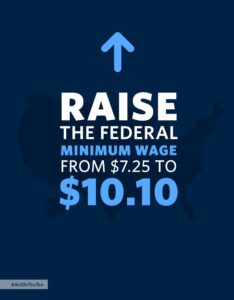President Obama’s decision to bypass Congress and raise the minimum wage from $7.25 to $10.10 for federal contract workers is a very big deal — and not just because it will force U.S. taxpayers to shell out more money on the same inefficiently delivered, often-unnecessary government services.
First, his power grab signals a remarkable new brazenness in his already contentious dealings with the legislative branch. Not only that, it marks a sudden and stunning reversal of his previous position on this issue.
“This has always been done legislatively,” White House spokesman Jay Carney said last month when asked about raising the wage unilaterally, “and it has been done with support from Republicans and not just Democrats in the past.”
Not anymore, apparently.
The President is doubling down on his far left economic agenda — shaking down American taxpayers in a shameless sop to organized labor (the prime beneficiary of his decision). Why kowtow to the unions now? Easy: The ongoing Obamacare debacle has exposed a serious, potentially debilitating political rift between the administration and union leaders — who continue to voice their “bitter disappointment” with the implementation of the new law.
Using our money, he is now effectively trying to buy Big Labor back into the fold: Knowing full well the coffers of dozens of vulnerable Democrats depend on it.
Looking at the raw numbers, the order doesn’t seem to pack much of a punch. At most, it would impact roughly 200,000 contract workers (out of an estimated workforce ranging from 2-3 million employees). Even this small slice of the pie could be overstated, though, as it represents an upper-end estimate of federal contract workers making less than $12 per hour.
How many of these employees already make more than the minimum wage? Most of them, it would appear. Referencing comments from contractors, National Review’s Jim Geraghty notes “a federal contractor making minimum wage is rarer than hen’s teeth.”
To the extent there are federal contract workers making $7.25 an hour, they will receive the equivalent of a 7.8 percent annual raise dating back to 2009 – the last time the minimum wage was increased.
Have your income levels gone up by 39 percent over the last five years? Not according to data from the U.S. Bureau of Labor Statistics (BLS).
Of course the real impact isn’t going to be felt by the impoverished minimum wage worker (again, to the extent such an employee exists within the sprawling federal system). Instead it will be felt up the income ladder — as labor unions peg their base-line wages to the minimum wage on either a percentage or premium basis. And higher wages for union workers means they will pay more in dues — which means a bigger campaign account for Big Labor.
This decision clearly isn’t about those making minimum wage, it is about higher-wage union workers getting a bump because the entire scale must be adjusted upward. And most of all, it is about the financial boon this upward adjustment creates for their dues-collecting bosses.
Who gets hurt by Obama’s move? In addition to the taxpayer, smaller contractors who bid on government work will find themselves in a far less competitive position under the new wage levels. Ultimately, that means smaller profits and fewer jobs for them — not to mention a shrinking pool of bidders for government contracts (which will drive costs even higher).
There’s simply no scenario in which this plays out to anyone’s benefit: Except union workers and their Big Labor bosses. Oh, and the President’s Congressional allies.
True limited government supporters oppose a minimum wage on principle. Wages should be paid based on what the free market will bear — and any attempt by government to manipulate that process will only create havoc on the economy.
Congress can stop this, and more importantly, they can block the broader minimum wage hike the President seeks for the private sector economy.
The author is president of Americans for Limited Government.







